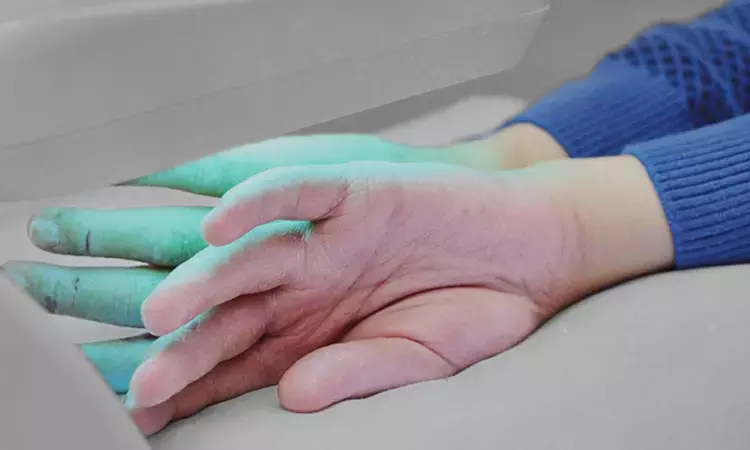- Home
- Medical news & Guidelines
- Anesthesiology
- Cardiology and CTVS
- Critical Care
- Dentistry
- Dermatology
- Diabetes and Endocrinology
- ENT
- Gastroenterology
- Medicine
- Nephrology
- Neurology
- Obstretics-Gynaecology
- Oncology
- Ophthalmology
- Orthopaedics
- Pediatrics-Neonatology
- Psychiatry
- Pulmonology
- Radiology
- Surgery
- Urology
- Laboratory Medicine
- Diet
- Nursing
- Paramedical
- Physiotherapy
- Health news
- Fact Check
- Bone Health Fact Check
- Brain Health Fact Check
- Cancer Related Fact Check
- Child Care Fact Check
- Dental and oral health fact check
- Diabetes and metabolic health fact check
- Diet and Nutrition Fact Check
- Eye and ENT Care Fact Check
- Fitness fact check
- Gut health fact check
- Heart health fact check
- Kidney health fact check
- Medical education fact check
- Men's health fact check
- Respiratory fact check
- Skin and hair care fact check
- Vaccine and Immunization fact check
- Women's health fact check
- AYUSH
- State News
- Andaman and Nicobar Islands
- Andhra Pradesh
- Arunachal Pradesh
- Assam
- Bihar
- Chandigarh
- Chattisgarh
- Dadra and Nagar Haveli
- Daman and Diu
- Delhi
- Goa
- Gujarat
- Haryana
- Himachal Pradesh
- Jammu & Kashmir
- Jharkhand
- Karnataka
- Kerala
- Ladakh
- Lakshadweep
- Madhya Pradesh
- Maharashtra
- Manipur
- Meghalaya
- Mizoram
- Nagaland
- Odisha
- Puducherry
- Punjab
- Rajasthan
- Sikkim
- Tamil Nadu
- Telangana
- Tripura
- Uttar Pradesh
- Uttrakhand
- West Bengal
- Medical Education
- Industry
Home phototherapy as effective as office phototherapy in treating psoriasis, finds study

A recent study tested the narrowband ultraviolet B phototherapy (NB-UVB) for psoriasis at home and found it to be noninferior to office treatment, based on the outcomes that matter to patients, clinicians and payers. The findings of from the LITE study suggest that home phototherapy can be an effective first-line treatment for the patients suffering from moderate to severe psoriasis.
Phototherapy or light therapy is a treatment method which involves the exposure of skin to ultraviolet light under medical supervision. It is commonly used to manage conditions like psoriasis. The patients typically undergo phototherapy sessions either at a the office of dermatologist or at home using specialized equipment. However, many challenges can possibly hinder access to office-based phototherapy like the limited availability in certain regions, the inconvenience of frequent visits and high copayments. While home phototherapy presents an important alternative, it is less frequently covered by insurance and some clinicians hesitate to recommend it.
The Light Treatment Effectiveness (LITE) study was conducted from 2019 to 2023 to address these issues. This extensive research initiative was carried forward by the National Psoriasis Foundation (NPF), the University of Pennsylvania Perelman School of Medicine and the University of Utah, and was funded by the Patient-Centered Outcomes Research Institute (PCORI).
The primary objective of the LITE study was to evaluate and compare the effectiveness, safety and duration of treatment response between home-based and office-based narrowband ultraviolet B (NB-UVB) phototherapy for treating plaque or guttate psoriasis. The study included a diverse range of skin types to provide insights that are applicable across different demographics.
The participants in the LITE study were individuals aged 12 and older who had been diagnosed with plaque or guttate psoriasis and were candidates for phototherapy. The study population included individuals with a wide spectrum of skin tones, from very fair to very darkly pigmented skin, ensuring comprehensive and inclusive findings.
The LITE study meticulously analyzed the outcomes of home-based phototherapy and compared against those of clinic-based treatments by focusing on their effectiveness, safety and the duration of the treatment response. Also, the study explored whether skin color influenced the effectiveness of phototherapy.
The findings found that home phototherapy was non-inferior to office-based treatments. Both methods demonstrated excellent effectiveness and safety in the real-world settings across all skin types. This suggests that home phototherapy can serve as a first-line treatment option for psoriasis for individuals with no prior experience with phototherapy.
The results of the LITE study advocate for broader access to phototherapy treatments which highlight the potential of home phototherapy to provide a convenient, effective and safe option for managing psoriasis. The outcomes of this study could influence healthcare policies by pushing for better insurance coverage and encouraging the clinicians to consider home phototherapy as a critical alternative for the psoriasis patients.
Source:
The LITE study. (n.d.). Psoriasis.org. Retrieved May 28, 2024, from https://www.psoriasis.org/lite-study/
Neuroscience Masters graduate
Jacinthlyn Sylvia, a Neuroscience Master's graduate from Chennai has worked extensively in deciphering the neurobiology of cognition and motor control in aging. She also has spread-out exposure to Neurosurgery from her Bachelor’s. She is currently involved in active Neuro-Oncology research. She is an upcoming neuroscientist with a fiery passion for writing. Her news cover at Medical Dialogues feature recent discoveries and updates from the healthcare and biomedical research fields. She can be reached at editorial@medicaldialogues.in
Dr Kamal Kant Kohli-MBBS, DTCD- a chest specialist with more than 30 years of practice and a flair for writing clinical articles, Dr Kamal Kant Kohli joined Medical Dialogues as a Chief Editor of Medical News. Besides writing articles, as an editor, he proofreads and verifies all the medical content published on Medical Dialogues including those coming from journals, studies,medical conferences,guidelines etc. Email: drkohli@medicaldialogues.in. Contact no. 011-43720751


